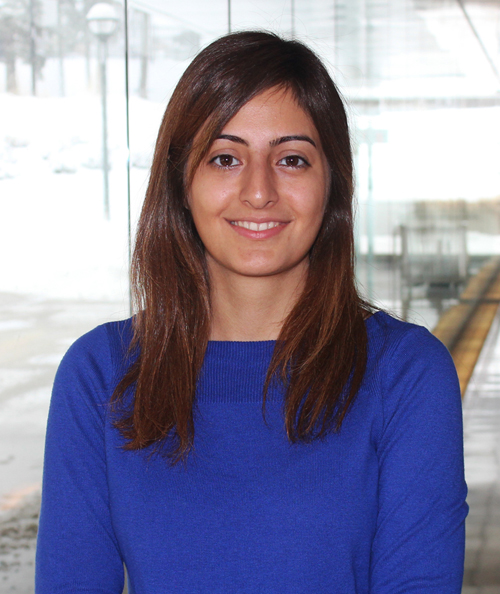Avish Kosari selected as Barbour Scholar for Research in low-power devices for the Internet of Things
Avish conducts research on ultra-low power and battery-less integrated circuits.

 Enlarge
Enlarge
Avish Kosari, PhD student in ECE, was selected to be a Barbour Scholar by the Rackham Graduate School. This award honors women of outstanding academic and professional achievement who are natives of Asia and study modern science, medicine, mathematics and other academic disciplines and professions critical to the development of their native lands.
Avish conducts research on ultra-low power and battery-less integrated circuits. She is a member of the wireless integrated circuits and systems group, directed by Prof. David Wentzloff, designing devices that will help enable the Internet of Things and a connected world.
Avish has recently focused on IoT wireless radios, where she is applying low power circuit design techniques to build a battery-less, long range radio for remote sensing applications. Remote sensors are often placed in a remote location where replacing or recharging batteries is impractical or impossible. In this design, she is implementing orthogonal frequency division multiplexing encoding schemes (used in WIFI or LTE radios) and is building a battery-less radio system for reliable long range data transmission and reception.
“The idea of having a connected world really inspires me,” she says. With the development of the IoT technology it will be possible to equip everything in our environment — from home appliances to industry equipment — with sensors that receive and transmit data and help with the coordination of tasks. “A key challenge in current research is the design of extremely low-power circuits capable of harvesting energy from heat, light, or mechanical vibrations,” Avish says.
Avish has worked on this technology, designing and implementing electrocardiogram (ECG) heart monitoring sensor nodes a novel ECG sensor front-end. ECG sensor nodes have many medical applications, such as measuring the patient’s heartrate, or diagnosing atrial fibrillation (AFIB). These low-power, wireless sensors could be integrated into a Band-Aid-like device that is powered from body heat for continuous and low-cost monitoring.
In the first year of her graduate studies Avish spent time as an intern at Dell, working on performance evaluation for their wireless platform. She is also the recipient of a Rackham International Student Fellowship.
Avish is excited by the impact of her research on the future of the Internet of Things.
 MENU
MENU 
